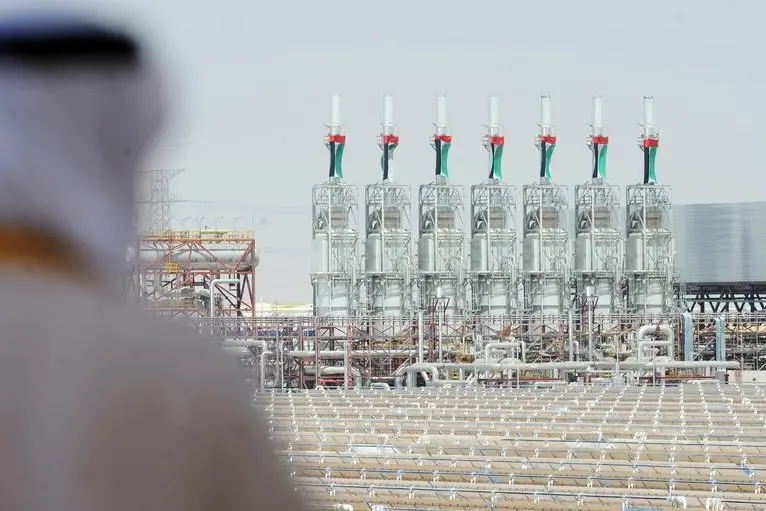PHOTO
Energy demand in MENA is growing at more than three times the global average
Energy efficiency projects in the Middle East and North Africa will provide attractive investment opportunities as governments in the region, particularly in Gulf Arab states, look to reduce energy consumption as rising demand strains resources.
Abu Dhabi emirate plans to launch a new Energy Efficiency Expo as part of The World Future Energy Summit in 2017 that would serve as a business matchmaking program to address energy efficiency solutions in the MENA region, where energy demand is expected to grow by 8.3 percent a year between 2013 and 2019.
"I think that the most appealing part of energy efficiency, is that it is commercially viable. From what we have seen in the United Arab Emirates and also outside the UAE, energy efficiency projects and initiatives have returns on investment which range from as short as two months, and more complex energy efficiency measures pay back within seven years," said Saeed Al Abbar, chairman of Emirates Green Building Council.
"As a return on investment, that is extremely favourable with very low risk. The internal rate of return that is achievable on energy efficiency reaches up to 30 percent," he said at Abu Dhabi Sustainability Week last month.
According to the International Renewable Energy Authority, global energy efficiency investment is set to reach USD 385 billion per year, or USD 5.8 trillion by 2030.
Energy demand in the Middle East and North Africa is growing at more than three times the global average, according to a report by the University of Cambridge and PwC issued by National Bank of Abu Dhabi (NBAD).
"The investment required for power generation, transmission and efficient use of energy is in the order of tens of billions of US dollars per year in the (Gulf) region...Continued rising demand will ensure a locked in energy demand, which underpins the attractiveness of this area as an investment proposition," said the March 2015 report.
"If the region is to take a world-leading role in these areas, opening itself to a global marketplace and participating in the financing of energy projects in other nations that have set ambitious sustainability targets, it will be necessary to demonstrate the ambitions and the delivery capability at home."
ENERGY INTENSITY
Population growth and economic expansion have increasingly strained power supplies in the MENA region, with more than 170 GW of additional capacity required in the Gulf region alone by 2020, according to the NBAD report.
Several countries are investing in power production, renewable energies, especially solar power, and developing cleaner energy technologies to find sustainable solutions to growing demand.
The UAE has launched several renewable energy projects, including Masdar's Shams 1 concentrated solar power plant, the largest CSP plant outside the United States and Spain, and Dubai's Mohammed bin Rashid Al Maktoum Solar Park, which set a record-low tariff, demonstrating that renewable energy sources are financially competitive with traditional fuels.
Dubai Electricity and Water Authority said in November it planned to launch the "Dubai Green Fund" which would provide low-cost loans for investors in the clean energy sector of Dubai, which aims to obtain 7 percent of its energy from lower-emissions sources by 2020, according to Reuters.
"To tackle the issue of sustainability, we have to focus on both the supply and the demand sides. On the supply side, we have launched big projects, wind, solar...but that's only one part of the equation. If we don't try to reduce our consumption and to improve our efficiency, we won't be able to meet the demand," Ahmad Belhoul, CEO of Abu Dhabi's Masdar, told media at Abu Dhabi Sustainability Week.
Gulf Arab states, which have offered generous energy subsidies for years, have the highest energy use and carbon dioxide emissions per unit of gross domestic product of any global region, and managing domestic demand for fuel and electricity has been a key challenge in countries where consumers are used to cheap supplies.
Following the sharp decline in crude oil prices, several oil-exporting Gulf states have moved on subsidies reforms to reduce government spending, including curbing energy subsidies. Some governments have also put in place measures to promote efficiency, such as mandatory building regulations in Abu Dhabi.
"We are in a region which is very energy inefficient. We use twice as much of energy per unit of GDP than the industrialized countries. So reducing subsidies and reducing the use of fossil fuel, not only helps the environment, it makes us more energy efficient," said Nasser Saidi, chairman of the Clean Energy Business Council.
"Awareness is one part, and then pricing of carbon correctly is very important since we are under pricing. Third, we need to think of rules and regulations and building codes that will help us become more energy efficient. That is why smart cities, which the UAE is a pioneer in within the region, are very important," he added.
Belhoul said that Masdar City -- developed to be a "greenprint" for how cities can accommodate rapid urbanisation while reducing energy, water and waste -- has proven that sustainability is a good business model.
"We are now delivering buildings that are 50 to 60 percent more energy efficient. For us, the introduction of the expo (Energy Efficiency Expo) falls perfectly in place with what we do in Masdar. It's an invitation for all companies internationally to come here and do business and to try to push efficiency forward," he said.
© Zawya 2016





















